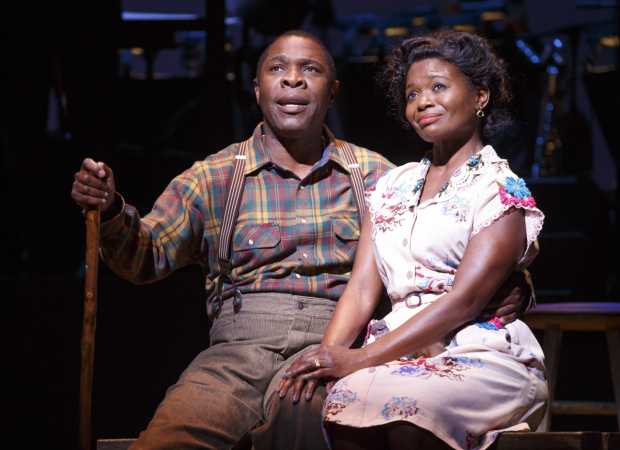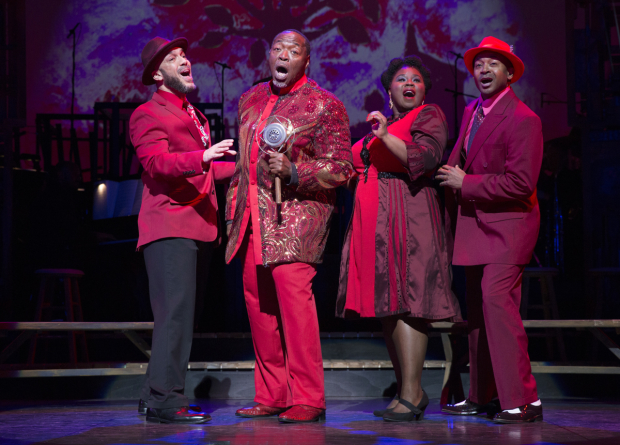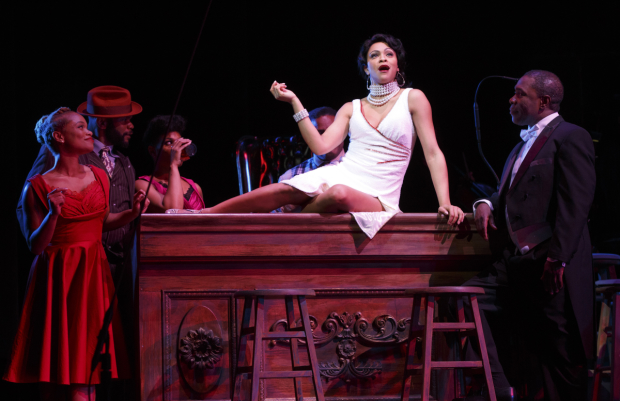
(© Joan Marcus)
Encores! loves old musicals, but rarely does the company present a show as obscure as Cabin in the Sky, composer Vernon Duke, lyricist John La Touche, and book writer Lynn Root's fanciful take on African-American religious folklore in the early 20th century. This practically lost musical hasn't been seen on Broadway since 1941 and is now mostly known through the 1943 Vincente Minnelli film (which dumped most of the Duke-La Touche score). While we can appreciate why the show never really joined the canon of classic musicals (like its far more popular contemporary Porgy and Bess), it is still a thrill to hear lovingly re-created at New York City Center.
The story follows Petunia (LaChanze) and "Little Joe" Jackson (Michael Potts), a poor black couple living in the rural South. Petunia is a God-fearing woman, but Joe can't seem to stay away from booze, gambling, and fast women like Georgia Brown (Carly Hughes). The story begins with Joe bed-ridden after being stabbed by local tough Domino Johnson (Jonathan Kirkland). Petunia prays to God to save his life. Just as the devil's son (Chuck Cooper) is about to take Joe's soul, the Lord's General (Norm Lewis) intercedes, granting Joe a six-month reprieve to clean up his act. But will Satan's temptations prove too much for Joe to resist?

(© Joan Marcus)
Book writer Lynn Root's treatment of Christian theology is admittedly simplistic, and his portrayal of black Americans’ relationship to that theology verges on paternalistic. Writing about the 1940 Broadway production for the Pittsburgh Press, critic Richard Watts Jr. slammed Cabin as being "done for the purposes of showmanship by white composers and authors who seemed chiefly interested in the quaintness of their subject." (While performed by an all-black cast, the primary drivers of the creative team — composer Duke, director George Balanchine, and designer Boris Aronson — were all Russian immigrants with a limited grasp on the African-American experience.) With "Little Joe" proudly spouting lines like, "Pastor Green say I'm one of the best Ameners in the parish," it's difficult to dismiss Watts' critique. These characters are a little too cute for their own good.
Thankfully, director Ruben Santiago-Hudson and Encores! artistic director Jack Viertel (who helped with the concert adaptation) keep the tone buoyant and airy, highlighting the craftsmanship of the score while acknowledging the ridiculousness of the book. Nothing is too serious and everything is fair game for a laugh.
This is especially apparent in Cooper's performance as "The Head Man" (known in the original as "Lucifer Jr."). He swans around the stage in a fabulous gold and red sequined jacket that looks like it was snatched out of Little Richard's wardrobe (beautiful work by costume designer Karen Perry). Even as the far soberer Lord's General, Lewis gets in a few zingers with the song "It's Not So Bad to Be Good," expertly interpreting brilliant La Touche lyrics like, "In old Gomorrah the strugglin' sinners / All got roasted like blue-plate dinners."
Tongue firmly planted in cheek, Potts embodies the lovable dolt at the center of our tale. Hughes, meanwhile, does her best Jessica Rabbit as temptress Georgia Brown (Perry deliciously outfits her in an apple-print dress), bringing down the house with the showstopper "Honey in the Honeycomb."

(© Joan Marcus)
Appropriate as she's playing a true believer, LaChanze delivers the evening's only completely sincere performance. She lends her bright vocals and even brighter smile to Petunia, making us giddy with "Taking a Chance on Love," a jazz standard that is certainly the score's most enduring. "I'm so happy that sometime it scares me. I'm just afraid that it ain't gonna last," she confides to God, expressing an anxiety that many of us have surely felt. It's only through her performance that the serious themes of life and death ever come to the fore in this mostly lighthearted romp.
That's as it should be. We don't go to Encores! for gut-wrenching drama; we go to hear beautiful old Broadway scores brought back to life with a full onstage orchestra, and that's exactly what we get here. From the moment maestro Rob Berman strikes up the overture, we know what kind of show we're in for: The blasting horns, elegant woodwinds, sweeping strings, and epic timpani make us feel like we're in the presence of an MGM studio orchestra, one that can effortlessly juggle multiple styles (gorgeous orchestrations by Jonathan Tunick). The jazz inflections of Duke's score occasionally give way to something that sounds like Stravinsky, with violently accented strings heralding the soldiers of hell (Duke also composed classical music under his birth name, Vladimir Dukelsky). The Encores! orchestra flawlessly glides through it all.
One understands the appeal such an eclectic score would have had for a multifaceted choreographer like Balanchine. While his original dances for Cabin have been lost to history (unlike the ubiquitous and aggressively licensed work of Jerome Robbins), we get a sense of what they might have looked like through the imaginative choreography of Camille A. Brown. Dancers jeté across the stage in a ballet of vice meant to tempt Joe. Couples bump and grind in the local watering hole. A sexy, sweaty rumba brings a little Havana to the Latin-infused song "Savannah." It's very sophisticated and impressively executed by the ensemble.
Really, the wisp of a book is just an excuse for the song and dance. What is truly surprising is how so few of the songs from Cabin (beyond "Taking a Chance on Love") have gained popularity. That may change after this production. You'll be humming tunes from this one for weeks.











